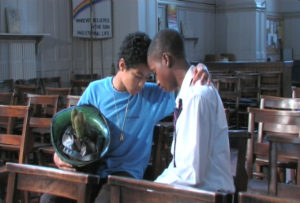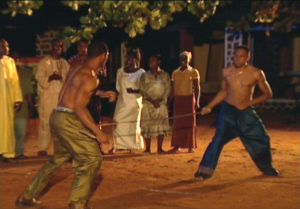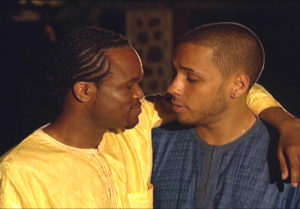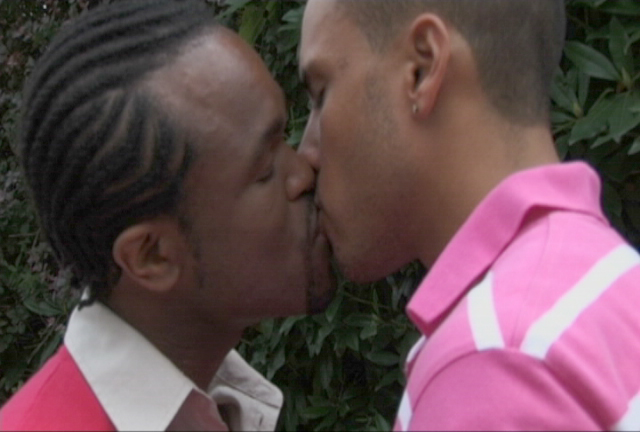Rag Tag encompasses the diversity within the African Diaspora.
It is the love story of a Nigerian man and his West Indian lover. This alone makes it a brave representation in a queer cinema world too replete with impossibly small white twinks with the same factory setting of blond hair and blue eyes. Raymond and Tagbo were childhood friends who grow up extremely close, despite coming from different worlds. West Indian Raymond is poor, with absentee parents, and essentially raises himself on the streets, hence his nickname, Rag. Tag is short for Tagbo, the only son of middle-class Nigerians, who initially takes Rag in as a surrogate son. Their friendship is tender, transparent, and unspoiled. Naturally, Tag’s traditional (read homophobic) father believes the two are becoming too close, and secretly starts a chain of events to have Rag removed from their lives through social services. This inciting incident, the moment where nothing will ever be the same for Rag and Tag, is what true homophobia feels like. Director Adaora Nwanda decides to show us the heartlessness of homophobia by showing how such an evil mindset can convene to destroy even the purest relationships and happiness. This moment becomes even more poignant at the end of the film when Tag confronts his father and explains that they didn’t even know they could be romantically involved. They had no words for how they felt about each other, just a feeling that they were the only two people in the world who got one another. “How can you take that from your own son,” he demands of his father. And for once, the loudmouth, bible thumper remains mute, if still unapologetic.

Breaking Colorism
Rag Tag also defies the colorist tropes of the hypermasculine darker skin “top” and the femininized lighter/fairer skin “bottom.” Throughout the film, we are shown that Tagbo’s (Tag) beautiful dark skin, unambiguous West African features, and cornrows house a tender-hearted intellectual who fights with his mind and legal education. Mixed race and ambiguously featured Raymond (Rag) is Tag’s knight in shining armor, physically fighting his way back to Tag. Rag engages in a toxic display of masculinity disguised as a game, he takes Tag’s place in a stick fighting game the former is pressured into, by a homophobic family member. Rag is lashed during the altercation, but ultimately wins the competition and proves to himself that he is still a “man” despite his same-sex attraction. This might not be the most ideal way to process his emotions, but it was a personal triumph that Rag needed to move forward with for Tag. More importantly, Rag proves his willingness to protect Tag. He challenges Tag to be prepared to do the same. Reciprocity remains a major theme within their love story.

Emotional Explorations

Nwanda’s instincts are spot-on. Often when storytellers are telling a story outside their own experience, their attempts to portray a marginalized groups’ struggles onscreen focus on extreme physical and mental torture inflicted by a caricature of a devil. Those with experience with these character’s stories know that the real pain comes from denial of self-worth, happiness, and community. Denial of humanity is often the deeper emotional pain. This is why stories depicting enslaved people by African-American studies scholars often focus on broken families, denial of love and relationships, fighting for one’s humanity, and questions of evil to highlight the inhumanity of enslavers and systemic racism. Writers without this expertise often focus on the most extreme forms of physical trauma inflicted on Black bodies in an attempt to “highlight” the evil, but often fall into trauma porn and wish fulfillment redemption arcs.
Rag Tag keeps the physical torment down to that one particular scene, and frames it as a masculine sacrifice to protect a lover. The story’s conflict mostly centers on the two men trying to find the words and understanding for the growing connection between them and the societal pressures opposing their union. Tag must overcome his domineering, traditional Nigerian parents who have set him on a course to graduate from Law school and marry a woman. Rag battles with the echoes of his rough childhood, including feeling abandoned because Tag never looked for him, though this is revealed to be a deception by Tag’s father. They both have to figure out how to have relationship free of the heteronormative boxes that suffocate same-sex couples. Keeping these emotional explorations at the heart of the film, and using social conflicts like casual homophobia as obstacles, are what makes Rag Tag a valued edition to the queer film canon.

Comments